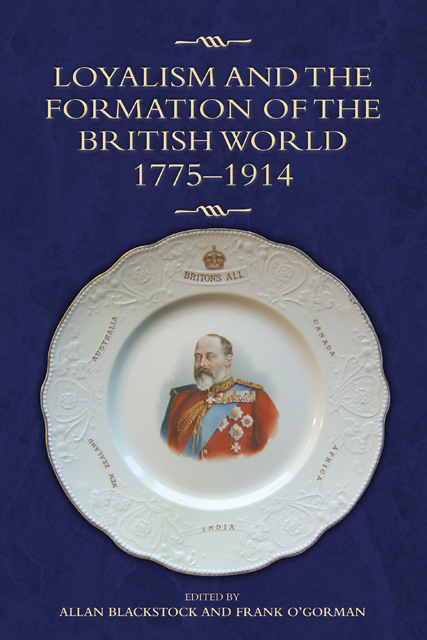Book contents
- Frontmatter
- Contents
- Notes on Contributors
- 1 Loyalism and the British World: Overviews, Themes and Linkages
- 2 Origins and Trajectories of Loyalism in England, 1580–1840
- 3 The ‘Spirit of Loyalty’: Material Culture, Space and the Construction of an English Loyalist Memory, 1790–1840
- 4 Anti-Catholicism and Orange Loyalism in Nineteenth-Century Britain
- 5 Loyalty and the Monarchy in Ireland, c.1660–c.1840
- 6 The Trajectories of Loyalty and Loyalism in Ireland, 1793–1849
- 7 Presbyterians, Loyalty and Orangeism in Nineteenth-Century Ulster
- 8 Unionists and Patriots: James Whiteside, the Irish Bar and the Dilemmas of the Protestant Nation in Victorian Ireland
- 9 Loyalism in British North America in the Age of Revolution, c.1775–1812
- 10 ‘A Colonial Hybrid’: Nineteenth-Century Loyalism as Articulated by the Orange Order in the Maritime Colonies of British North America
- 11 Canadian Catholics, Loyalty, and the British Empire, 1763–1901
- 12 Loyalism in Australasia, 1788–1868
- 13 ‘We love one country, one queen, one flag’: Loyalism in Early Colonial New Zealand, 1840–80
- 14 Clientelism, Community and Collaboration: Loyalism in Nineteenth-Century Colonial India
- Select bibliography
- Index
11 - Canadian Catholics, Loyalty, and the British Empire, 1763–1901
Published online by Cambridge University Press: 28 February 2023
- Frontmatter
- Contents
- Notes on Contributors
- 1 Loyalism and the British World: Overviews, Themes and Linkages
- 2 Origins and Trajectories of Loyalism in England, 1580–1840
- 3 The ‘Spirit of Loyalty’: Material Culture, Space and the Construction of an English Loyalist Memory, 1790–1840
- 4 Anti-Catholicism and Orange Loyalism in Nineteenth-Century Britain
- 5 Loyalty and the Monarchy in Ireland, c.1660–c.1840
- 6 The Trajectories of Loyalty and Loyalism in Ireland, 1793–1849
- 7 Presbyterians, Loyalty and Orangeism in Nineteenth-Century Ulster
- 8 Unionists and Patriots: James Whiteside, the Irish Bar and the Dilemmas of the Protestant Nation in Victorian Ireland
- 9 Loyalism in British North America in the Age of Revolution, c.1775–1812
- 10 ‘A Colonial Hybrid’: Nineteenth-Century Loyalism as Articulated by the Orange Order in the Maritime Colonies of British North America
- 11 Canadian Catholics, Loyalty, and the British Empire, 1763–1901
- 12 Loyalism in Australasia, 1788–1868
- 13 ‘We love one country, one queen, one flag’: Loyalism in Early Colonial New Zealand, 1840–80
- 14 Clientelism, Community and Collaboration: Loyalism in Nineteenth-Century Colonial India
- Select bibliography
- Index
Summary
At times Lord Durham found the attitudes of Canada’s religious groups much different than to what he was accustomed in Great Britain. In 1839, while gathering together materials for what would become his famous report on the state of British North America after the unsuccessful rebellions of 1837–38, Durham (John George Lambton) came upon meetings of the Loyal Orange Order in Upper Canada. Surprised at their activities, Durham commented:
Its members profess to desire to uphold the Protestant religion, but to be free from those intolerant feelings towards their Catholic countrymen, which are the distinctive marks of Irish Orangemen. They assert that their main object … is to maintain the connexion with Great Britain … and at their public dinners, after drinking to the ‘pious, glorious and immortal memory,’ with all the usual formality of the abuse of the Catholics, they toast the health of the Catholic Bishop, M’Donnell.
For students of Irish and imperial history, it might appear strange that an organisation which was avowedly anti-Catholic would openly drink to the good health of the local Catholic bishop. However, suppositions that the Catholic population of Canada was inimical to the British Protestant Empire cannot be sustained by very strong evidence. Indeed, the French Canadian Catholic hierarchy, and its Scottish and Irish constituents, co-operated with the colonial administration, offered prayer and supplications for the Crown, encouraged their flocks to participate in the political life of the British North American colonies and, in several instances, be prepared to take up arms for the defence of the Empire. The documentary evidence sustaining a view of episcopal and clerical loyalty to the Crown in British North America is plentiful as it is strong. We know with less certainty, however, how Catholics in the pews accepted the opinions, suggestions, and mandates of their ‘shepherds’.
Given their histories, there was no reason for the Catholic charter groups of British North America to be loyal to the English crown. The French, Scots, and Irish all had recent unpleasant experiences with the British Empire. In 1763, after the defeat of French forces globally to Britain and her allies, the 70,000 Catholic inhabitants of the St Lawrence valley and its hinterlands had little to trust their new conquerors. Just prior to the Seven Years War, les Canadiens knew very well that, in 1755, their French Catholic neighbours in Acadia had been deported by the thousands.
- Type
- Chapter
- Information
- Loyalism and the Formation of the British World, 1775-1914 , pp. 201 - 222Publisher: Boydell & BrewerPrint publication year: 2014
- 1
- Cited by

